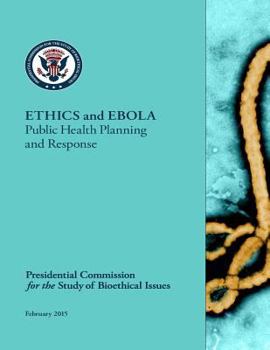Ethics and Ebola Public Health Planning and Response
Dear Mr. President: On behalf of the Presidential Commission for the Study of Bioethical Issues, wepresent to you our brief, Ethics and Ebola: Public Health Planning and Response.In this brief the Bioethics Commission focuses on ethical challenges raised bythe current Ebola epidemic in western Africa, with a particular focus on theU.S. response to the epidemic. We address the pressing need to improve keyelements of our planning and response capabilities for future public healthemergencies, including leadership, transparency, and explicit ethics integrationat all levels of public health decision making.Recognizing the importance of transparent public dialogue and deliberationon public health emergency response and the Ebola epidemic, the BioethicsCommission held two public meetings on this topic, and heard from speakerswith diverse backgrounds and perspectives, including medicine, public health, and clinical research; U.S. and African health care professionals; communityleaders from the western African diaspora in the United States; and individualsinvolved in the Ebola response. In addition, the Bioethics Commission solicitedpublic comment and received many thoughtful replies.The current Ebola epidemic reveals how the response to outbreaks of infectiousdisease can reflect national values. Deliberate development of public healthpolicies in accordance with high ethical and evidentiary standards is the markof a society committed to national and global health. U.S. participation in acoordinated global response to this epidemic is both ethically and prudentiallyrequired to fulfill our humanitarian obligations as global citizens and to protectour national health security.The Bioethics Commission believes that empowered leadership, strong globalpublic health infrastructure, effective communication, and agile ethics expertiseare critical to ensuring our capability to respond to the next public health crisis.The best time to reflect comprehensively and deliberate on our readiness isduring response planning, not in the midst of an emergency. We must take thisopportunity, when the world is focused on global public health, to integrateeach of these elements into our existing public health infrastructure.Here the Bioethics Commission offers seven recommendations to improvedomestic and global public health response capabilities and to ensure thatspecific aspects of emergency response, including the use of restrictive measuressuch as quarantine, and research conducted during an emergency, are guided bythe highest ethical standards and robust public deliberation.The Bioethics Commission is honored by the trust you have placed in us, andwe are grateful for the opportunity to serve you and the nation in this way.Sincerely, Amy Gutmann, Ph.D.ChairJames W. Wagner, Ph.D.Vice Ch
Format:Paperback
Language:English
ISBN:1539826716
ISBN13:9781539826712
Release Date:January 1
Publisher:Createspace Independent Publishing Platform
Length:92 Pages
Weight:0.52 lbs.
Dimensions:0.2" x 8.5" x 11.0"
Customer Reviews
0 rating





